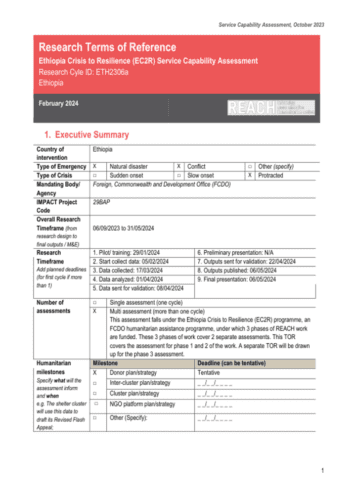Attachments
Background
The second most populous country in Africa, Ethiopia’s 123 million people2 are affected by a multitude of complex issues. Ongoing conflict, crisis-level food insecurity, flooding, drought and disease outbreaks are some of the multiple and often overlapping crises that continue to strain the lives of communities, refugees, internally displaced people and returnees in Ethiopia. An estimated 20 million people3 are affected by these crises across multiple regions in Ethiopia.
Nearly 4.6 million people are currently displaced across Ethiopia due to ongoing conflict within the country.Issues of security and humanitarian access are limiting access to and functioning of basic services, including health and nutrition, education and WASH services. Ethiopia’s Humanitarian Response Plan for 2023 estimates that over 17.3 million people are in need of various health interventions, 20.5 million people are in need of humanitarian WASH assistance, and 10.3 million children and adults are in need of improved education services.
Understanding the extent to which basic services are functioning to meet the needs of the people they intend to serve, is a critical part of improving services. Whilst there is no comprehensive research on the capabilities of services in Ethiopia ongoing, some sector specific research has been conducted. This includes the World Health Organization Health Resources and Services Availability Monitoring System (HeRAMS), which analyses the operational status of the health systems. A HeRAMs has been conducted in Tigray and Afar, with the possibility of expansion into other regions. Several joint educational needs assessments (JENA) have been undertaken or are underway in various regions in Ethiopia. However, comprehensive mapping and analysis of the function and capability of all health, nutrition, education and water services has to date, not been conducted in Ethiopia.
With limited information on the location, function and capability of basic services, humanitarian intervention and development planning is limited. In response to de-centralised information management across the country, detailed and up-to-date infrastructure information is required to feed into the humanitarian and development programming across the country. This information will also enable the regional and national government to plan a coordinated humanitarian response to address the needs and barriers to assessing services across the country.
To respond to this need, FCDO, under its Ethiopia Crisis to Resilience (EC2R) programme, will fund a range of assessments, including a service capability assessment. The capability assessment component will map and assess the service capability of 3 sectors (health and nutrition, water, education). This assessment will provide the humanitarian and development actors operating in Ethiopia with updated data of the capability and barriers of health and nutrition, water and education infrastructure to serve the population in need.
Source link : https://reliefweb.int/report/ethiopia/research-terms-reference-ethiopia-crisis-resilience-ec2r-service-capability-assessment-research-cyle-id-eth2306a-ethiopia-february-2024
Author :
Publish date : 2024-02-02 08:00:00
Copyright for syndicated content belongs to the linked Source.
